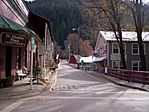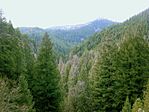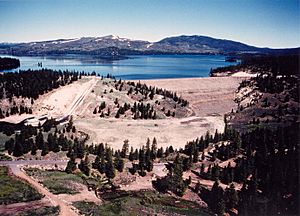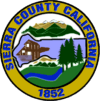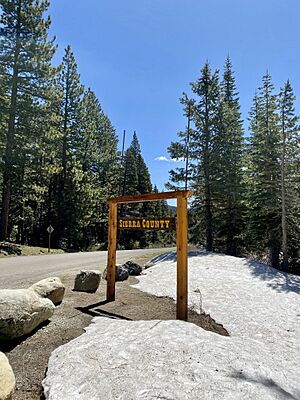Sierra County, California facts for kids
Quick facts for kids
Sierra County, California
|
||
|---|---|---|
| County of Sierra | ||
|
Images, from top down, left to right: Downieville, Conifer forest in the Tahoe National Forest, Stampede Dam
|
||
|
||
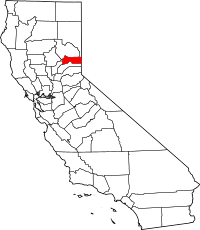
Location in the state of California
|
||
| Country | ||
| State | ||
| Region | Sierra Nevada | |
| Incorporated | April 16, 1852 | |
| Named for | Sierra Nevada | |
| County seat | Downieville | |
| Largest city | Loyalton | |
| Government | ||
| • Type | Council–Manager | |
| Area | ||
| • Total | 962 sq mi (2,490 km2) | |
| • Land | 953 sq mi (2,470 km2) | |
| • Water | 9 sq mi (20 km2) | |
| Highest elevation | 8,844 ft (2,696 m) | |
| Population | ||
| • Total | 3,236 | |
| • Density | 3.3638/sq mi (1.2988/km2) | |
| GDP | ||
| • Total | $0.114 billion (2022) | |
| Time zone | UTC-8 (Pacific Standard Time) | |
| • Summer (DST) | UTC-7 (Pacific Daylight Time) | |
| Area code(s) | 530 | |
| Congressional district | 3rd | |
Sierra County is a county in the state of California. As of 2020, about 3,236 people lived there. This makes it California's second-smallest county by population. The main town, or county seat, is Downieville. The only official city is Loyalton. Sierra County is located in the Sierra Nevada mountains, near the border with Nevada.
Contents
History of Sierra County
Sierra County was created in 1852 from parts of Yuba County. It got its name from the Sierra Nevada mountain range.
Before the California Gold Rush, the Maidu and Washoe tribes lived in this area. They would spend summers in the mountains to hunt and fish. In winter, they moved to lower areas.
Gold Rush Days
When gold was found in California, many miners came to Sierra County. Between 1848 and 1860, over 16,000 miners settled here. Most mining towns grew along the North and Middle Forks of the Yuba River. These rivers had lots of gold. Some towns disappeared when the gold ran out. But others, like Downieville and Sierra City, are still around today.
Some very large gold nuggets were found in the county. Sailors found a 26.5-pound nugget near Downieville. In 1853, a group of Frenchmen found a 51-pound nugget. The huge 106-pound Monumental Nugget was discovered in 1869 near Sierra City.
The Bald Mountain drift mine in Forest City started in 1864. It was the biggest of its kind back then. The Sierra Buttes Gold Mine, a large quartz mine, began in 1850 near Sierra City. By 1880, the county had many mines and long water ditches for mining.
Geography and Nature
Sierra County covers about 962 square miles. Most of this is land, with 9 square miles of water. The county is in the Sierra Nevada mountains. It has many different landscapes, from tall mountains to thick forests. There are also many lakes and streams. This area is great for hiking, fishing, and hunting.
Neighboring Counties
Sierra County shares borders with these other counties:
- Nevada County, California - to the south
- Yuba County, California - to the west
- Plumas County, California - to the north
- Lassen County, California - to the northeast
- Washoe County, Nevada - to the east
Protected Natural Areas
Parts of these national forests are in Sierra County:
- Plumas National Forest
- Tahoe National Forest
- Toiyabe National Forest
Getting Around
Sierra County has only one traffic light! It's a flashing red light where highways 49 and 89 meet. It was removed for a while after an accident but put back in 2008.
Main Roads
 U.S. Route 395
U.S. Route 395 Interstate 80
Interstate 80 State Route 49
State Route 49 State Route 89
State Route 89
Local Roads
Public Transportation
Public transportation is limited. Senior citizen groups in Downieville and Loyalton run vans. Other people can ride if there's space.
Airport
The Sierraville-Dearwater Field Airport is a small airport near Sierraville. For bigger flights, the closest major airport is in Reno.
People of Sierra County
| Historical population | |||
|---|---|---|---|
| Census | Pop. | %± | |
| 1860 | 11,387 | — | |
| 1870 | 5,619 | −50.7% | |
| 1880 | 6,623 | 17.9% | |
| 1890 | 5,051 | −23.7% | |
| 1900 | 4,017 | −20.5% | |
| 1910 | 4,098 | 2.0% | |
| 1920 | 1,783 | −56.5% | |
| 1930 | 2,422 | 35.8% | |
| 1940 | 3,025 | 24.9% | |
| 1950 | 2,410 | −20.3% | |
| 1960 | 2,247 | −6.8% | |
| 1970 | 2,365 | 5.3% | |
| 1980 | 3,073 | 29.9% | |
| 1990 | 3,318 | 8.0% | |
| 2000 | 3,555 | 7.1% | |
| 2010 | 3,240 | −8.9% | |
| 2020 | 3,236 | −0.1% | |
| 2023 (est.) | 3,200 | −1.2% | |
| U.S. Decennial Census 1790-1960 1900-1990 1990-2000 2010 2020 |
|||
Population in 2020
In 2020, Sierra County had 3,236 people.
| Race / Ethnicity (NH = Non-Hispanic) | Pop 2000 | Pop 2010 | Pop 2020 | % 2000 | % 2010 | % 2020 |
|---|---|---|---|---|---|---|
| White alone (NH) | 3,210 | 2,855 | 2,615 | 90.30% | 88.12% | 80.81% |
| Black or African American alone (NH) | 6 | 5 | 7 | 0.17% | 0.15% | 0.22% |
| Native American or Alaska Native alone (NH) | 56 | 41 | 18 | 1.58% | 1.27% | 0.56% |
| Asian alone (NH) | 5 | 12 | 7 | 0.14% | 0.37% | 0.22% |
| Pacific Islander alone (NH) | 3 | 2 | 1 | 0.08% | 0.06% | 0.03% |
| Other Race alone (NH) | 2 | 1 | 25 | 0.06% | 0.03% | 0.77% |
| Mixed Race or Multi-Racial (NH) | 60 | 55 | 186 | 1.69% | 1.70% | 5.75% |
| Hispanic or Latino (any race) | 213 | 269 | 377 | 5.99% | 8.30% | 11.65% |
| Total | 3,555 | 3,240 | 3,236 | 100.00% | 100.00% | 100.00% |
Ancestry Groups (2015)
In 2015, the largest groups of people by ancestry in Sierra County were:
| Largest ancestries (2015) | Percent |
|---|---|
| English |
19.0% |
| German |
18.2% |
| "American" |
16.1% |
| Scottish |
6.4% |
| Italian |
5.9% |
| Polish |
4.6% |
| Portuguese |
4.0% |
| Swiss |
3.6% |
| Swedish |
3.2% |
| French |
3.1% |
Local News
Sierra County has two old newspapers.
The Sierra Booster covers the Sierra Valley region. It has been published twice a week since 1949. It was started by Hal Wright and his wife Allene. Their daughter Janice Wright Buck runs it today.
The other paper is Mountain Messenger. It is based in Downieville. This newspaper has been printed without stopping since 1853. It is the longest-running weekly newspaper in California. A famous writer, Mark Twain, used to write for it. He was using his real name, Samuel Clemens, at the time.
In 2020, the future of The Mountain Messenger was uncertain. The owner, Don Russell, retired after 30 years. But a local retiree, Carl Butz, bought the paper and keeps it going. The paper is printed every Thursday in Quincy. It is delivered across Sierra, eastern Plumas, and western Nevada counties.
Education
- Sierra-Plumas Joint Unified School District
Towns and Communities
City
Census-Designated Places (CDPs)
These are areas that are like towns but are not officially incorporated as cities.
- Alleghany
- Calpine
- Downieville (This is the county seat, where the county government offices are.)
- Goodyears Bar
- Pike
- Sattley
- Sierra Brooks
- Sierra City
- Sierraville
- Verdi
Other Communities
These are smaller places that are not officially cities or CDPs.
Ghost Towns
These are towns that used to exist but are now abandoned.
- Eureka City
- Howland Flat
- Pine Grove
- Poker Flat
- Potosi
- Shady Flat
Population Ranking (2010 Census)
This table shows the population of the main communities in Sierra County based on the 2010 census.
† county seat
| Rank | City/Town/etc. | Type | Population (2010 Census) |
|---|---|---|---|
| 1 | Loyalton | City | 769 |
| 2 | Sierra Brooks | CDP | 478 |
| 3 | † Downieville | CDP | 282 |
| 4 | Sierra City | CDP | 221 |
| 5 | Calpine | CDP | 205 |
| 6 | Sierraville | CDP | 200 |
| 7 | Verdi | CDP | 162 |
| 8 | Pike | CDP | 134 |
| 9 | Goodyears Bar | CDP | 68 |
| 10 | Alleghany | CDP | 58 |
| 11 | Sattley | CDP | 49 |
See also
 In Spanish: Condado de Sierra (California) para niños
In Spanish: Condado de Sierra (California) para niños
 | Audre Lorde |
 | John Berry Meachum |
 | Ferdinand Lee Barnett |


